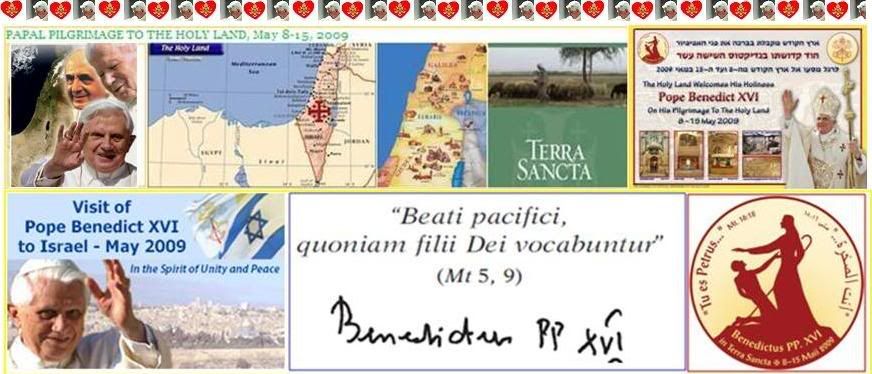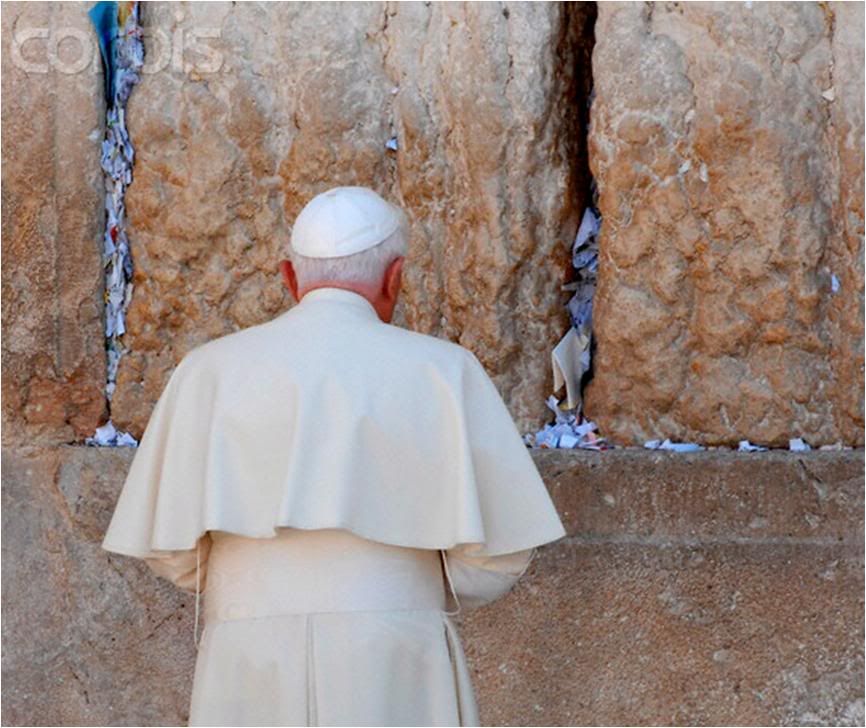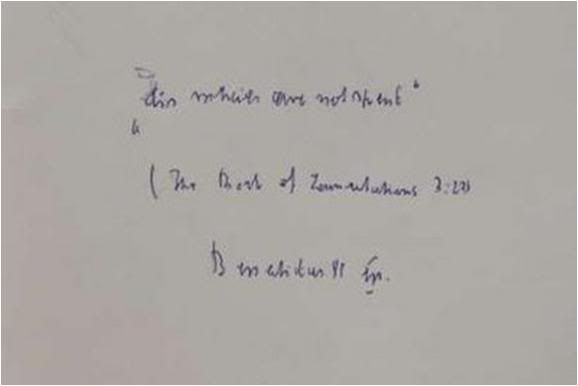 After watching and listening to the highly impassioned program the Plaestinians offered the Pope at the Aida refugee camp, I felt as bludgeoned to mental numbness as I did when listening to the emcee at Yad Vashem last Monday.
After watching and listening to the highly impassioned program the Plaestinians offered the Pope at the Aida refugee camp, I felt as bludgeoned to mental numbness as I did when listening to the emcee at Yad Vashem last Monday.
I was far from unprepared that the Palestinians would seize the day to present their cause on the world stage. When will they have as good an opportunity again? And they would have to be saints and angels not to have used the opportunity to the utmost. As they did.
It may not be 'right' in principle to 'use' the Pope in this way, but I'm pretty sure he does not mind, coming from the Palestinian civilians. (I don't know if he was as lenient about Mons. Twal's pre-Mass address yesterday, which was as inflammatory in its way as Sheik al-Tamimi's intrusive tirade at the inter-religious dialog, that ironically, Mons. Twal tried in vain to stop.)
In fact, the Holy Father most likely facilitated it for the Palestinians, in effect, having decided obviously when his program for the visit was being drawn up, that he wanted to spend the time he did with them. EWTN's Raymond Arroyo recalled today that John Paul II's visit to Aida in 2000 was comparatively token - 'a brief drop-in and a wave'.
But before the Palestinians even, Israel's Chief Rabbis also sought to enlist Benedict XVI in the cause of an Israeli homeland, something that Joseph Ratzinger/Benedict XVI has long acknowledged, along with a two-state concept.
Chief Rabbi to Pope:
Tell the world that Jews belong in Israel
By Yair Ettinger

May 13, 2009
Israel's leading rabbis on Tuesday told Pope Benedict XVI that it was his duty to spread the message that the Jewish people belong in the Land of Israel.
"You represent a large nation of believers that knows what the Bible is, and it is your duty to pass on the message that the Jewish people deserve a renaissance, and a little respect - to live in this land," Sephardi Chief Rabbi Shlomo Amar told the Pope.
The Pope met with Amar and Ashkenazi Chief Rabbi Yonah Metzger in Jerusalem on Tuesday, on the second day of his pilgrimage to Israel
[To the Holy Land, not to Israel!]
Benedict told the chief rabbis during the meeting that he is committed to reconciliation between Christian and Jews.
He said he has delivered a prayer to God to help enact the command that one love their neighbor as they do themselves.
Metzger told the Pope that he regretted that such meetings had not been held earlier in history.
"I thought to myself, if only a historic meeting like this in which the head of the biggest religion in the world meets in Jerusalem with the heads of Judaism, if this had happened many years earlier, so much innocent blood could have been saved," Metzger said.
"So much senseless hatred could have been prevented in the world," he said.
[I don't think that historically, Judaism ever sought to relate to othere religions, and that in fact, part of its distinction is that it does not seek converts to Judaism at all and remains a closed religion in that respect.]
The Pope continued his historic pilgrimage through the Holy Land earlier Tuesday, visiting the Western Wall in Jerusalem.
He recited a prayer in Latin, before placing a note in the cracks of the wall, as is the custom. The Chief Rabbi of the Western Wall, Shmuel Rabinovich, also recited a prayer.
Earlier, Benedict visited the Temple Mount, where he shook hands with the mufti of Jerusalem and senior Islamic Waqf officials.



The German-born Pope stood in prayer for several minutes at the Western Wall, a remnant of the Roman-era Temple complex that is Judaism's holiest place, after meeting the Grand Mufti, Palestinians' senior Muslim cleric, at the Dome of the Rock which dominates the Old City.
With the mufti, he recalled the common roots of all three monotheistic religions in the story of Abraham and Jerusalem.
He placed a written prayer in the Western Wall, a traditional gesture, and then met Israel's two chief rabbis.
"Send your peace upon this Holy Land, upon the Middle East, upon the entire human family," the prayer said, according to text provided by the Vatican.
Palestinians later released balloons over Jerusalem's Old City in the colors of the Palestinian flag while the Pope was at the Western Wall.
In the light that has happened in the past three days - Jordan was an oasis of sweetness and light, by comparison - it's interesting to read what George Weigel wrote about the Pope's trip before it began.
More important than his observation that these days, a Pope's travels are also inevitably political because of what the people he meets can choose to make of those meetings, is his pointing to the role of Scriptures in orienting Benedict XVI's thinking.
And obviously, more than on his previous trips, the Pope has been quoting Scriptures to Christians, Jews and Muslims alike.... To think the Jewish media completely ignored his Scriptural references in the Yad Vashem discourse, and the line full of faith and hope from the Book of Lamentations that he chose to write in the Holocaust Memorial's guest book.
 "His mercies are not spent" (Lamentations 3, 22)
"His mercies are not spent" (Lamentations 3, 22)
To understand the Pope's visit to the Holy Land,
start with his view of Scripture
By George Weigel

May 6, 2009
No matter how much the Vatican rightly insists that the primary purpose of Benedict XVI's journeys outside Rome is to "strengthen the brethren" — as Christ instructed Peter to do — papal travel is inevitably political travel. Especially when that travel is to the Holy Land.
Wherever a Pope visits, local interest groups and politicians will lobby for their pound of pontifical flesh, seeking to advance their causes or their ambitions through access to the man in the white simar.
Moral credibility is particularly at stake whenever a Pope visits a conflicted part of the world: Leaders may not really care what Ban Ki-moon, the secretary-general of the United Nations, thinks of them, but just about everyone short of Kim Jong Il and Mahmoud Ahmadinejad wants it known that the Pope thinks that he or she is on the side of the angels.
So it is that Pope Benedict XVI's May 8-15 visit to Jordan, Israel and the Palestinian Authority has dredged up all the usual controversies and questions.
What leaders from what groups will the Pope see, and what will that mean? What will this German Pontiff say about the Holocaust? What will his visit do to advance or retard the "peace process," the position of Israel, the prospects for a Palestinian state?
This is inevitable. It's also unfortunate, in that it tends to deflect the world's attention from the most salient personal fact about the Pope's journey — that it's a pilgrimage by a man of the Bible to the land of the Bible.
While pundits and partisans will interpret Benedict's comments and actions according to the varying political winds and their own agendas, a real understanding of his pilgrimage must start at the true source of Benedict's own thinking: Scripture.
Lingering stereotypes about Benedict XVI's theological "conservatism" notwithstanding, the fact is that, as a seminary student and doctoral candidate in postwar West Germany, Joseph Ratzinger was a theological innovator who insisted that theology begins with Scripture and must always return to Scripture as a crucial reference point.
Finding the cold logic of the theology of his day dull and inhuman, Ratzinger was drawn to the theological approach taken by those men of the first millennium known as the "Fathers of the Church": intellectual and pastoral giants like Ambrose, Augustine, John Chrysostom, Basil, Gregory Nazianzen, Gregory of Nyssa and Ephrem the Syrian, for whom theology was, at bottom, a matter of explicating the Bible.
Young Joseph Ratzinger thought that a return to the Bible and the Fathers would re-energize theology after the catastrophes of the first half of the 20th century. To that project of revitalization he has dedicated more than a half century of his scholarly life.
Interestingly enough, Benedict's basic approach to Scripture could almost be described as Protestant: for Joseph Ratzinger, the Bible is "first and foremost God's word to the Church," as Father Thomas Rausch of Loyola Marymount University writes in a new book on Benedict's theological perspective.
Put another way, the Bible is not, for Benedict, simply a text. The Bible is an integral part of God's search for us, in this case through a sacred literature that remains the "word of God," millennia after its words were first recorded.
Where Benedict differs from some Protestant interpreters is that he is not a biblical literalist; where he differs from the older Catholic theology he disliked in the 1940s and 1950s is that he doesn't treat the Bible as a library of proof-texts to be ransacked in order to buttress abstract theological points.
Rather, as Father Rausch puts it, Benedict's biblical commentary is built on a "finely tuned sensitivity to biblical themes and images, which he traces effortlessly through both testaments."
Following St. Bonaventure, on whom he wrote his second doctoral thesis, Benedict insists that Scripture is personal as well as literary. The Bible, properly understood, is an encounter between the living God and the people He wills to bring to the fullness of life—people who lived millennia ago and people alive today.
Thus to reduce "the Bible" to a matter of letters arranged on a page is to empty it of its personal dimension, which is both divine and human.
This conviction about the personal dimension of the Bible — combined with his settled skepticism about certain forms of modern intellectual life — undergirds Ratzinger's longstanding critique of what is known as the "historical-critical method" of biblical interpretation.
Benedict XVI is no fundamentalist or literalist. He is quite prepared to let what scholars have learned about the origins and evolution of biblical texts shape his own reading of the Bible. What he is not prepared to do is to reduce the Bible to an archaeological specimen.
Historical criticism of the Bible can tell us a lot of things, Ratzinger believes. But, as Father Rausch puts it, it "cannot really tell us what the text means for us today."
Ratzinger's intense encounter with the Hebrew Bible and the Christian New Testament over more than half a century has given him both a deep reverence for the Bible and a theologically grounded reverence for living Judaism — which is the most solid basis possible for genuine friendship and mutual regard.
Benedict knows that the Hebrew Bible is integral to Christianity. As he once wrote, "the New Testament is not a different book of a different religion that, for some reason or other, had appropriated the Holy Scriptures of the Jews as a kind of preliminary structure. The New Testament is nothing other than the interpretation of 'the Law, the Prophets, and the Writings' found from or contained in the story of Jesus."
Finally, Benedict is also something of a biblical populist. As one of the theologians who helped draft a critical document of the Second Vatican Council, the Constitution on Divine Revelation, Joseph Ratzinger wanted to restore the Bible to the people of the Church, so that the Bible would be, once again, a font of Christian prayer and understanding.
Thus one facet of his critique of the hyperventilated historical criticism in which some scholars engage is that it takes the Bible away from the people of the Church, by suggesting to ordinary believers that this complicated ancient text can only be read by the experts.
During his visit to the land of the Bible, Pope Benedict XVI will say and do many things. Just about all of those things will be sifted through the media filter and dissected for every nuance of political meaning.
But underlying everything he says and does will be his profound reverence for the Bible. He is firmly convinced that these ancient books speak words of truth and light today. He will say that, in many variations on a great theme. It remains to be seen who will be listening.
[
George Weigel holds the William E. Simon Chair in Catholic studies at Washington's Ethics and Public Policy Center, is a NEWSWEEK contributor.]
[Modificato da TERESA BENEDETTA 14/05/2009 13:16]